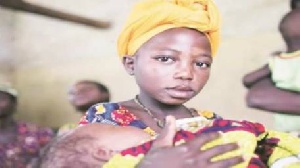Marriage has become a fashionable act among school girls in basic school in Bugubelle, a community in the Sissala East District to the extent that they are complicit in the act.
Consequently, the Parents Teachers Association (PTA) in the community and other opinion leaders instituted a penalty that the young men who marry these girls would pay. The penalty includes a payment of an amount of GHS 500 or more and the girl returned to her parents to continue her education.
Sadly, as the old proverb goes: “as long as the hunter knows how to shoot without missing so has the bird learnt to fly without perching”, the girls and their lovers have found a way to avoid the payment of this penalty and its accompanied sanctions.
What do the girls do?
A girl drops out of school due to poor performance and plans with her lover to travel to Accra to work as a head porter for some time. Upon her return, she then marries her lover. Usually, when these girls return there’re traits that show that they have no intentions of returning to school. These traits include: a bleached skin and a hairdo. Immediately her family members notice this she is deemed to be independent and she is left to her devices.
Before the girls who have intentions of getting married leave Bugubelle for Accra, they are usually supported financially by their lovers who are also school drop outs. In an interview with 17 year old Fati (not her real name), who has a baby boy, she dropped out of school in JHS Two to go and work as a head porter in Accra. Before she decided to drop out, her form master and some family members advised her against the decision. Her lover also did not agree with her initially, but she was able to convince him and he supported her with an amount of one hundred and fifty Ghana Cedis.
Fati left Bugubelle for Accra in November 2016 and returned in June 2017 after working as a head porter in Accra. She returned to Bugubelle with an amount of two hundred Ghana cedis which she used in purchasing utensils and other kitchen wares – with the intention of getting married, because she had returned with a hairdo and it was clear to everyone in the community that another girl has dropped out of school to join the marriage band wagon.
In an interview with the Assemblyman Jimbilia Dema Amin it was revealed that in the end of year report of the PTA, thirty four girls had dropped out of school in the 2016/2017 academic year. These girls dropped out from classes five and six as well as form one and two. Mr. Amin narrated how some parents and teachers had to follow up on school girls who had dropped out and travelled to Accra to work as head porters. One of the girls who were brought back to Bugubelle left home again and has since travelled to Banda Nkwanta.
In another interview with the PTA Chairman, Alidu Hamza, he couldn’t hide his disappointment and the hopelessness of the situation. His disappointment was as a result of the fact that the girls themselves are playing roles in the act. According to him, there hadn’t been any culprit who has been made to pay the penalty since the girls don’t marry immediately after they drop out, instead they travel and upon their return, they’re no longer pupils so marrying becomes the next thing to do.
The phenomenon of dropping out of school, child marriage and teenage pregnancy in Bugubelle keeps rising by the day. A native of the community revealed that weekly, girls who drop out of school travel to Accra to work as head porters as well as return to Bugubelle to get married to their lovers. Due to this trend, some drivers have found it a lucrative business to convey these dropouts in groups when they are leaving and upon their return.
Although these girls who drop out from school and end up marrying after returning from Accra regret their decisions, there’re still other girls who do not see this. For instance in an interview with Fati, she said that her friends who had been in Accra before her told her that Accra is hard, but she responded that she would want to go and see.
In all of this, the Girl Child Unit of the Ghana Education Service as well as the Ministry of Gender and Social Protection must rise to the occasion and make marriage among basic school girls in Bugubelle unfashionable.
Opinions of Wednesday, 24 January 2018
Columnist: modernghana.com















